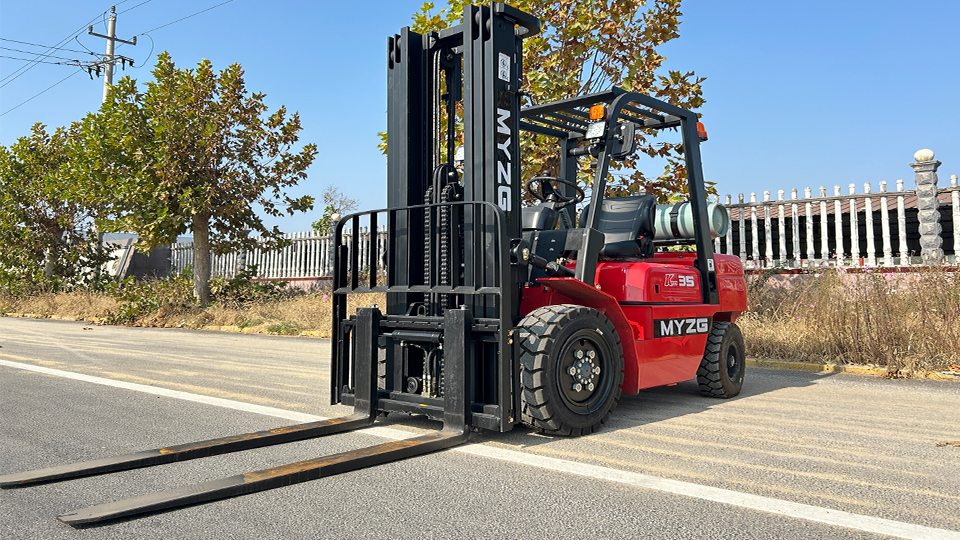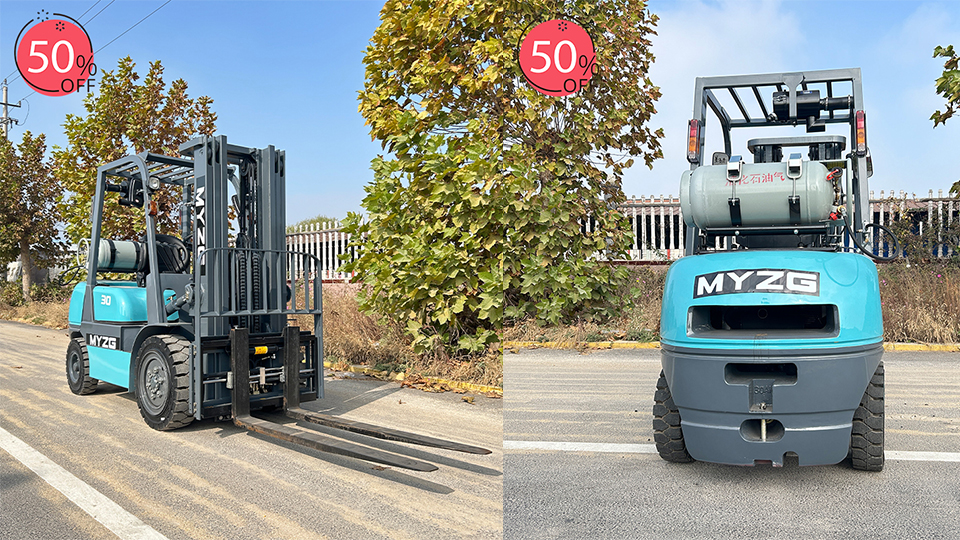
What Kind of Gas Do Forklifts Use? A Comprehensive Technical Overview
Forklifts are indispensable workhorses in a vast array of industries, from manufacturing and warehousing to construction and retail. Their ability to lift, move, and stack heavy loads efficiently is critical to modern logistics and productivity. While electric forklifts are gaining traction, a significant portion of the global forklift fleet still relies on internal combustion (IC) engines. Understanding the fuel types these IC forklifts utilize is crucial for operational efficiency, safety, environmental compliance, and cost management. This comprehensive technical article delves into the various "gases" forklifts use, primarily focusing on propane (LPG), but also touching upon gasoline, diesel, and natural gas, offering insights into their technical characteristics, advantages, disadvantages, and applications.
The Predominant Fuel: Propane (LPG)
Without a doubt, Liquefied Petroleum Gas (LPG), commonly known as propane, is the most prevalent fuel source for IC forklifts, particularly in indoor and mixed-use environments. Propane is a colorless, odorless (odorants like ethyl mercaptan are added for leak detection), non-toxic, and readily flammable gas that is compressed into a liquid for storage and transport. It is a by-product of natural gas processing and petroleum refining.
Technical Characteristics of Propane:
Chemical Composition: Propane is primarily composed of hydrocarbons, with the chemical formula C 3 H 8 . Commercial propane often contains small amounts of other hydrocarbons like butane and propylene.
Storage and Handling: Propane is stored under pressure as a liquid in specially designed cylinders or tanks. The liquid propane vaporizes into a gas as it's released, which is then fed into the forklift's engine. Forklifts typically use standardized, refillable propane cylinders that are quick and easy to swap out.
Octane Rating: Propane has a high octane rating (typically around 104-110 research octane number, or RON), making it resistant to engine knocking and suitable for high-compression engines.
Energy Density: While lower than gasoline or diesel by volume, propane has a decent energy density, allowing for reasonable run times per cylinder. Its volumetric energy density is approximately 25.5 MJ/L (megajoules per liter), whereas its gravimetric energy density is around 49.6 MJ/kg.

Combustion Products: When combusted efficiently, propane produces primarily carbon dioxide (CO 2 ) and water vapor (H 2 O). Compared to gasoline or diesel, it generally produces fewer particulate matter (soot), hydrocarbons (HC), and nitrogen oxides (NO
x ).Advantages of Propane Forklifts:
Versatility (Indoor/Outdoor Use): Propane forklifts are unique among IC forklifts in their suitability for both indoor and outdoor operations. Their cleaner-burning nature, particularly when equipped with catalytic converters, allows them to meet air quality standards for indoor environments.
Consistent Power Output: Unlike battery-electric forklifts that experience a power fade as their charge diminishes, propane forklifts maintain consistent power output throughout the entire cylinder life.
Rapid Refueling: Swapping out an empty propane cylinder for a full one takes only a few minutes, minimizing downtime. This is a significant advantage over electric forklifts that require hours for recharging.
Lower Emissions (Compared to Gasoline/Diesel): Propane burns cleaner than gasoline or diesel, resulting in lower emissions of carbon monoxide (CO), unburned hydrocarbons, and particulate matter. This makes them a more environmentally friendly option for indoor applications.
Simplified Infrastructure: Propane fueling stations are relatively straightforward to set up, requiring only secure storage for cylinders and a designated fueling area.
Reliability in Cold Weather: Propane performs well in cold temperatures, as its low boiling point ensures proper vaporization even in chilly conditions.
Disadvantages of Propane Forklifts:
Fuel Storage and Handling: Propane cylinders, while convenient, require dedicated storage areas that comply with safety regulations. They are also heavy and necessitate proper ergonomic handling during cylinder changes.
Risk of Leaks: While rare, propane leaks pose a fire and explosion hazard. Proper training, maintenance, and leak detection are essential.
Emissions Still Present: While cleaner than other IC fuels, propane forklifts still produce emissions (CO 2, CO, NO x) that necessitate ventilation in indoor settings.
Fuel Costs Fluctuation: Propane prices can fluctuate based on market demand and supply, impacting operational costs.
Cylinder Management: Managing the inventory of full and empty cylinders, including return and refill logistics, adds a layer of operational complexity.
Applications of Propane Forklifts:
Propane forklifts are ideal for a wide range of applications including:
Warehouses and distribution centers
Manufacturing facilities
Food and beverage industries
Retail environments (e.g., big-box stores)
Construction sites (for light-duty to medium-duty tasks)
Any operation requiring continuous, multi-shift operation without significant downtime for recharging.
Other Fuel Types for Forklifts
While propane dominates, other fuel types are also used in specific forklift applications, each with its own set of characteristics.
1. Gasoline
Gasoline-powered forklifts were once more common but have seen a decline in popularity, particularly for indoor use, due to stricter emission regulations and the rise of propane and electric alternatives.
Technical Characteristics: Gasoline is a complex mixture of hydrocarbons, primarily ranging from C 4 to C
12 . It has a lower flash point than diesel and a higher volatility.
Advantages:
Readily available fueling infrastructure (gas stations).
Generally lower upfront purchase cost for the forklift compared to some specialized fuel types.
Disadvantages:
High Emissions: Gasoline combustion produces higher levels of carbon monoxide (CO), hydrocarbons (HC), and nitrogen oxides (NO
x ) compared to propane, making them unsuitable for indoor use without extensive ventilation.
Lower Fuel Economy: Gasoline engines generally have lower fuel efficiency than diesel or propane engines in forklift applications.
Volatile Fuel: Gasoline is highly flammable and its vapors are explosive, requiring strict safety protocols during storage and handling.
Applications: Primarily outdoor, heavy-duty applications where emissions are less of a concern, such as lumber yards, construction sites, and some port operations.
2. Diesel
Diesel forklifts are known for their robust power, torque, and fuel efficiency, making them suitable for demanding outdoor applications.
Technical Characteristics: Diesel fuel is a heavier petroleum distillate than gasoline, composed of hydrocarbons ranging from C
10to C
15or more. It has a higher energy density than gasoline or propane.
Advantages:
High Power and Torque: Diesel engines are renowned for their high torque output, making them ideal for heavy lifting and towing tasks.
Fuel Efficiency: Diesel engines typically offer superior fuel economy compared to gasoline or propane engines, especially under heavy loads.
Durability: Diesel engines are generally more robust and have a longer lifespan than gasoline engines.

Disadvantages:
High Emissions: Diesel combustion produces significant amounts of particulate matter (soot), nitrogen oxides (NO x ), and sulfur dioxide (SO 2) (depending on sulfur content of fuel). These emissions make them completely unsuitable for indoor use without highly advanced and expensive exhaust treatment systems (e.g., Diesel Particulate Filters - DPFs, Selective Catalytic Reduction - SCR).
Noise and Vibration: Diesel engines are typically noisier and produce more vibration than gasoline or propane engines.
Maintenance: Diesel engines, particularly modern ones with emission control systems, can have more complex maintenance requirements.
Cold Weather Starting: Diesel fuel can gel in extremely cold temperatures, requiring specific additives or engine block heaters.
Applications: Primarily outdoor, heavy-duty applications such as:
Construction sites (rough terrain forklifts)
Container handling at ports
Logging and timber industries
Large-scale manufacturing with outdoor material handling
Any application requiring maximum lifting capacity and continuous operation in demanding outdoor environments.
3. Natural Gas (CNG/LNG)
While less common than propane, gasoline, or diesel, natural gas forklifts (Compressed Natural Gas - CNG, or Liquefied Natural Gas - LNG) represent a niche market, particularly for fleets with existing natural gas infrastructure or a strong commitment to alternative fuels.
Technical Characteristics: Natural gas is primarily methane (CH
4). CNG is stored under high pressure, while LNG is stored as a cryogenic liquid at very low temperatures.
Advantages:
Very Low Emissions: Natural gas is one of the cleanest-burning fossil fuels, producing significantly lower emissions of particulate matter, CO, and non-methane hydrocarbons compared to gasoline or diesel. Its CO
2emissions are also lower per unit of energy.
Abundant and Domestic Supply: In many regions, natural gas is a plentiful and domestically sourced fuel.
Lower Fuel Costs: Historically, natural gas prices have been more stable and often lower than gasoline or diesel.
Disadvantages:
Infrastructure Requirements: Setting up natural gas fueling infrastructure (especially for LNG) is expensive and complex, requiring specialized compression or liquefaction equipment. This is the primary barrier to widespread adoption.
Storage Space: CNG tanks are bulky due to the lower energy density of compressed gas, which can impact forklift design and available space. LNG tanks are also specialized and require cryogenic handling.
Limited Availability: While growing, the public fueling station network for natural gas is not as extensive as for gasoline or diesel.
Engine Modifications: Forklifts designed to run on natural gas require specific engine modifications.
Applications: Best suited for large fleets with centralized fueling facilities, often driven by environmental initiatives or access to affordable natural gas. Examples include large distribution centers or municipal operations.
Factors Influencing Fuel Choice
Several critical factors influence the decision of what kind of gas a forklift uses for a particular operation:
Operating Environment:
Indoor Use: Propane is preferred due to lower emissions. Electric forklifts are also a strong contender. Gasoline and diesel are generally unsuitable.
Outdoor Use: Diesel and gasoline are viable, especially for heavy-duty tasks. Propane also works well.
Emission Regulations: Strict local, state, or federal emission standards often dictate fuel choice, pushing operators towards cleaner options like propane or electric.
Duty Cycle and Run Time:
Continuous, Multi-shift Operations: Propane with quick cylinder swaps excels here.
Intermittent Use or Single Shift: Electric forklifts may be sufficient if charging time isn't a critical constraint.
Lifting Capacity and Power Requirements: Heavy-duty applications often lean towards diesel for its superior torque, while lighter to medium-duty tasks can be handled by propane or electric.
Fueling Infrastructure: Existing infrastructure or the willingness to invest in new infrastructure plays a significant role. Propane cylinder exchange is relatively simple, while natural gas requires substantial investment.
Upfront and Operating Costs: This includes the purchase price of the forklift, fuel costs, maintenance expenses, and the cost of infrastructure development.
Noise Levels: In noise-sensitive environments, electric forklifts are ideal, followed by propane. Diesel and gasoline are generally noisier.
Safety Considerations: Each fuel type has specific safety protocols for storage, handling, and refueling that must be rigorously adhered to.
Conclusion
In the realm of internal combustion forklifts, propane (LPG) stands out as the most widely adopted and versatile fuel. Its ability to operate safely and relatively cleanly both indoors and outdoors, combined with quick refueling times, makes it an ideal choice for a vast majority of material handling operations. While gasoline and diesel forklifts still serve critical roles in heavy-duty outdoor applications, and natural gas presents an intriguing but niche alternative, propane remains the bedrock of IC forklift power. The decision of what kind of gas a forklift uses is a complex one, requiring a thorough analysis of operational needs, environmental considerations, safety protocols, and economic factors to ensure optimal efficiency, productivity, and compliance in the dynamic world of material handling. As industries continue to evolve and environmental regulations become more stringent, the drive towards cleaner and more sustainable fuel sources for forklifts will undoubtedly continue to shape the future of this essential equipment.
Name: selena
Mobile:+86-13176910558
Tel:+86-0535-2090977
Whatsapp:8613181602336
Email:vip@mingyuforklift.com
Add:Xiaqiu Town, Laizhou, Yantai City, Shandong Province, China